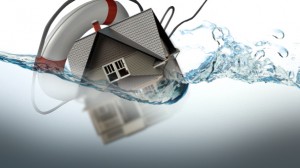May 22, 2012
 Mortgage lenders are definitely making it harder for you to obtain a mortgage.
Mortgage lenders are definitely making it harder for you to obtain a mortgage.
Especially when compared to the boom years when criteria was probably too
relaxed. It is a hard market to research at the moment because lenders are
constantly moving their goal posts as to what is required to obtain a mortgage.
One of the big changes in the market is that lenders are requiring large deposits
to allow you to go onto an interest only mortgage. Historically interest only
mortgages were available to everyone disregarding deposit levels however over the years this has changed. Over the last couple of years it has been pretty
standard for a 25% deposit to be required to go onto interest only however
these levels have increased by some lenders to 50%.
A repayment mortgage will guarantee that the mortgage is paid off by the end
of the term however an interest only mortgage is only paying the interest so at
the end of the term the mortgage amount owed will still be the same. This is a
big concern for mortgage lenders as at the end of the loan they will want the
mortgage to be repaid and is one of the reasons why there has been a reduction
in interest only mortgages.
To take out an interest only mortgage you have to prove that you have a
method to repay the mortgage through an alternative investment vehicle
such as an ISA. These checks are also becoming stricter to ensure that your
investment vehicle is realistically going to be able to pay off the mortgage.
This is just one way in which finding the right mortgage has become more
complicated due to the changes in criteria. There are also many other factors
such as employment status, proof of income, affordability and credit status.
It is wise to get advise if you have any doubt about whether or not you are
applying for the right mortgage because a mortgage broker can ensure that you
are not wasting your time and credit checks applying for a mortgage that you
may not be able to obtain. They can also ensure that you are getting the best
deal on the mortgage market.
Tags:
credit,
financial planning,
money,
mortgage,
Property,
real estate
April 13, 2012
 In 2012, the HARP refinance program for underwater homeowners was revamped. New guidelines have been set forth by the government and they are soon expected to be adopted by lenders. But, will the HARP program 2.0, as it has been nicknamed, live up to the expectations?
In 2012, the HARP refinance program for underwater homeowners was revamped. New guidelines have been set forth by the government and they are soon expected to be adopted by lenders. But, will the HARP program 2.0, as it has been nicknamed, live up to the expectations?
First, let’s take a look at what this program was designed to do. HARP was designed as a way for underwater homeowners to refinance their mortgages to current interest rates. This is assuming that their current interest rate on their mortgage is higher than todays rates, which is usually the case.
Homeowners who are current on their mortgage payments and have a loan that is backed by Freddie and Fannie will be able to refinance the loans. Homeowners who have late payments will not qualify and must look to other options such as loan modification or a short sale to avoid foreclosure.
The original HARP program placed a cap on your loan to value ratio, which eliminated many homeowners as participants in the program. Too many people had homes that were worth far less than they owed. With the new program, this cap has been lifted so that anyone who is upside down on their mortgage and meets the other requirements should be able to qualify and refinance. Exciting, right?
Sure, if you believe everything that you read.
Here is the main problem I see with the HARP underwater refinance program: The government does not control what lenders do. They only set the “guidelines” for the program and expect lenders to adopt them. The lenders have to agree to these guidelines and use them.
Why they won’t agree to these guidelines
Loans are backed by investors. For lenders to agree to these guidelines, investors must agree to these guidelines as well. Wall Street must agree to these guidelines! Do you think an investor will let someone who owes $300,000 on their home that is worth $125,000 refinance to a lower rate? I for one, do not.
What I think will happen with HARP
When the guidelines are officially adopted by lenders there will definitely be a “feeling out” period. Sure, HARP refinances will happen, but the majority of those refinances are going to be loans with an LTV (loan-to-value) of 125% or less. This is what investors are looking for. I think some lenders may be able to push up the cap to 135% or maybe even 145%, but I just don’t see it getting any higher than that.
HARP can say that they have new guidelines and no LTV cap for underwater homeowners looking to refinance, but it doesn’t mean it’s going to happen.
I imagine we will see similar problems with HARP that we saw with the HAMP loan modification program. Sounds great, but not many homeowners will qualify and get the help that they need.
About the author: Jeff G. is a prolific financial writer who has composed numerous articles relating to loan modification and the HARP refinance program.
Tags:
financial planning,
Home,
mortgage,
Property,
refinance,
Refinance Programs
March 8, 2012
 Have you considered taking advantage of the current real estate market and purchasing a home? If so, there are several things to take into consideration, including the following:
Have you considered taking advantage of the current real estate market and purchasing a home? If so, there are several things to take into consideration, including the following:
· Securing the best interest rate
· Getting pre-approved for a home loan
· Finding the property of your dreams
· Making an offer on your desired property
· Paying a down payment on your new home
With the current economic situation throughout the United States, many people desire to purchase a new home and may even be pre-approved for a home loan; however, the one thing that often keeps people from purchasing a new home is the dreaded down payment.
Down Payment Details
Unless you are able to secure a VA loan, most lenders require a down payment around 20%. Fortunately, some people qualify for an FHA loan that allows them to only pay 3.5% down. Therefore, if you desire to purchase a $150,000 home you are looking at a down payment up to $20,000. With the high unemployment rate and rocky economy, very few people have $20,000 in their savings account thereby making homeownership more difficult to achieve. Rest assured, there are some ways to secure a down payment for a new home.
Ways to Secure a Down Payment
Tax Refund. One of the easiest ways to obtain a nice down payment for your home loan involves increasing the taxes withheld from each of your paychecks by decreasing your number of dependents. As a result, you are able to receive a bigger tax refund each year, which can be put into a savings account or immediately used for a down payment, especially if you are able to obtain an FHA loan.
Sell Unwanted Items. Although this option may require a lot more effort than saving your tax refund, you can often sell unwanted or unused household items, jewelry, vehicles, and jewelry. You may have to spend several months trying to sell these items at yard sales or online; however, if you sell enough and continue to save the money you make off these items you will achieve your down payment and be on your way to owning a new home.
Save Wisely. The most common way to secure a down payment for a new home is often the one that takes the longest—saving money. This requires you to take out a certain amount of money from each paycheck and place it into a savings account until you are able to afford the payment.
Tags:
Home,
home mortgage,
Home owner,
investment,
Property,
Realestate
February 24, 2012
 Interest rates continue to fall and have entered all-time low territory. So why is there is no jubilation and lines of people at the banks trying to buy homes or refinance existing loans?
Interest rates continue to fall and have entered all-time low territory. So why is there is no jubilation and lines of people at the banks trying to buy homes or refinance existing loans?
Low Interest Rates Fail To Stimulate Housing
Despite the cheap money, it is still challenging for many homeowners who are underwater on their existing loans and who may have other credit blemishes due to job loss, job change or inconsistent income. Certainly, there are some people who are able to take advantage of the cheap money but not the massive numbers that we saw in boom years long past. Government stimulated initiatives continue to roll out which incentivize banks to refinance struggling homeowners into lower rate loans.
Retirees Suffer From Prolonged Low Interest Rates
There is a scary flip side to the interest rate environment. Pension funds which rely heavily on bonds and other interest rate based securities to generate sufficient invest returns to pay retirees are suddenly not making enough to cover their obligations. Compound that with retirees trying to living off their life savings which barely generates 1% return and you can begin to see the potential epidemic.
Perfect Storm Endangers Pension Funding
The longer we endure this type of interest rate environment, the wider the funding gap of pension plans. This will put pressure on stocks if companies are forced to close pension gaps with current earnings. When you also consider that 1) our massive Baby Boomer generation is retiring right now and 2) the longer life expectancies of Americans due to better health care, you can see how there are several layers creating a perfect storm of massive pension underfundings.
Good News, Bad News Economy
Most subjects dealing with the economy and finances have a pro and con. Just like when you buy and sell stocks, there is a winner and a loser. With economics, there are two sides to every coin. For example, low interest rates help homebuyers but hurt people living on fixed incomes. When interest rates rise, many investors will benefit, but people with adjustable rates on credit cards and other debt will have to pay more interest. Even if you do not understand all the details, as a consumer, it is wise to stay aware that good news in one sector means the potential for bad news elsewhere.
Tags:
economy,
Interest,
Interest Rates,
money,
Mortgage interest rates,
Mortgage rates,
Mortgare,
online mortgage,
Pension,
personal finance,
Rates
January 20, 2012
 Are you eyeing a mortgage relief? Well, the answer is most likely to be ‘yes’, as millions of homeowners across the U.S.A are struggling hard to find the effective relief program or help. Often, homeowners feel that the money that could be saved via the relief programs would help them sustain other costs that were so long been postponed due to financial restrictions. A number of alternatives offer effective relief programs helping the mortgager adjust with his or her payments. The relief ideas in actual sense come to your best help in times when a particular circumstance blocks your road to payment.
Are you eyeing a mortgage relief? Well, the answer is most likely to be ‘yes’, as millions of homeowners across the U.S.A are struggling hard to find the effective relief program or help. Often, homeowners feel that the money that could be saved via the relief programs would help them sustain other costs that were so long been postponed due to financial restrictions. A number of alternatives offer effective relief programs helping the mortgager adjust with his or her payments. The relief ideas in actual sense come to your best help in times when a particular circumstance blocks your road to payment.
Therefore, if you find yourself in hard times owing to mortgage payment then, consider relying upon any one of the following methods –
The Lender
While looking for a mortgage relief idea, consider contacting your lender, as a priority. All you need to do is call up the mortgage statement and request the call to be offered to the department of loss mitigation. This particular department helps in establishing a loan modification program that allows you to change the mortgage terms according to your convenience leading you towards a safe payment rather than foreclosure.
Refinance Program
The Home affordability Refinance Program (HARP) help in cases you have Freddie Mac or a Fannie Mae loan. This program allows the Fannie and Freddie mortgage holders to refinance their present mortgage within a value of 105 per cent to 125 per cent of the present value and worth of the home. This particular program also focuses on the idea of helping the mortgagers with better terms and conditions on the mortgage laying an improved situation financially. For availing, the best benefits with these two above-mentioned relief programs consider contacting the loan service provider for the application procedure.
Consult an Attorney
Consulting an attorney or a specialized real estate lawyer in times of hardship with your mortgage also helps in finding an effective mortgage relief program. If you are in a fixed financial situation then, consider relying upon your attorney for a loan medication program that can help in either delaying or avoiding a foreclosure.
Government Help
If you are facing problem in paying off your mortgage then, turning to government programs help in dealing with the mortgage issue. The Making Home Affordable Program and the Home Affordable Refinance Program are two such programs that are designed to assist the homeowners experiencing trouble with the mortgage payments.
However, while finding out the effective mortgage relief program, you need to keep in mind taking cautious steps towards the idea. Many a time, steps taken in hurry have resulted in bad decision that had further made the mortgage situation worsen leaving the mortgager in trouble. Therefore, it is advisable that you choose a relief program doing the background research well to save yourself from the hassles.
The author, Aalina Jones here provides smart suggestions on mortgage relief. This article will certainly help people gather plenty of information regarding loans and mortgage policies.
Tags:
budgeting,
debt freedom,
economy,
financial planning,
home mortgage,
money,
money/finance,
mortgage,
mortgage debt,
Mortgage loans,
Mortgage Refinance,
personal finance,
real estate,
real estate debt,
refinance,
refinance mortgage rates
 Mortgage lenders are definitely making it harder for you to obtain a mortgage.
Mortgage lenders are definitely making it harder for you to obtain a mortgage.




Recent Comments